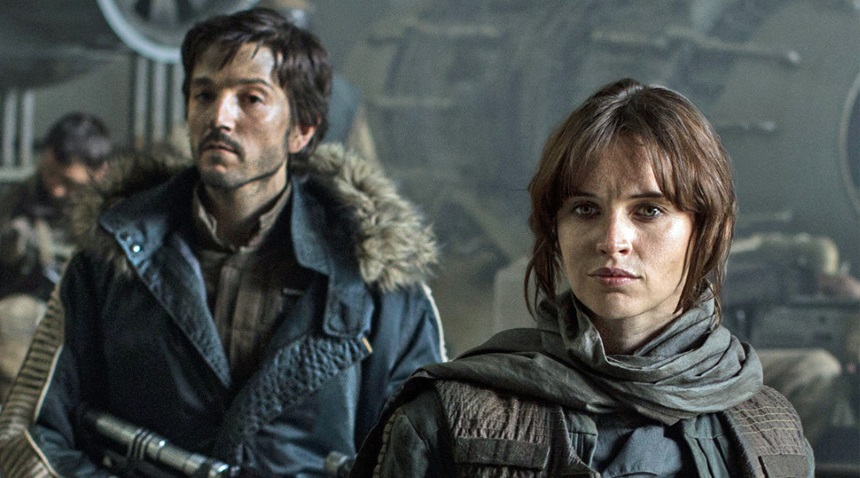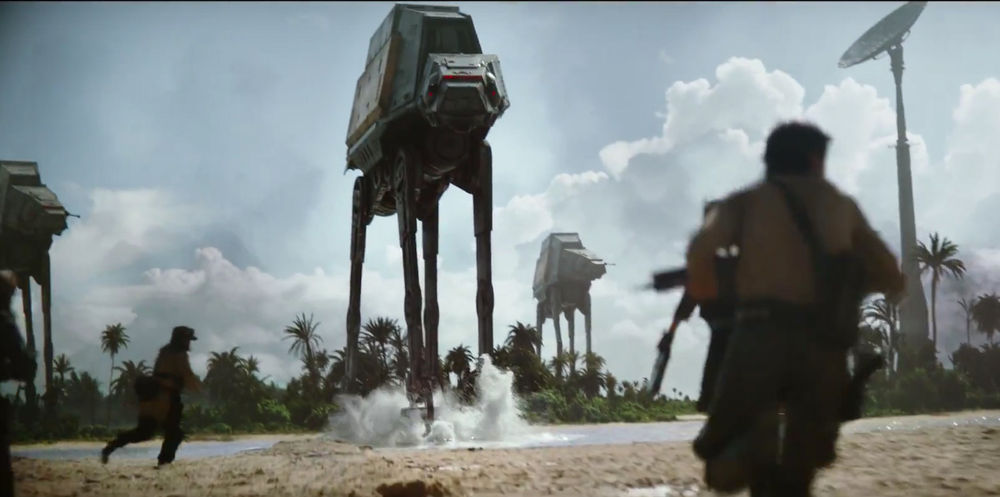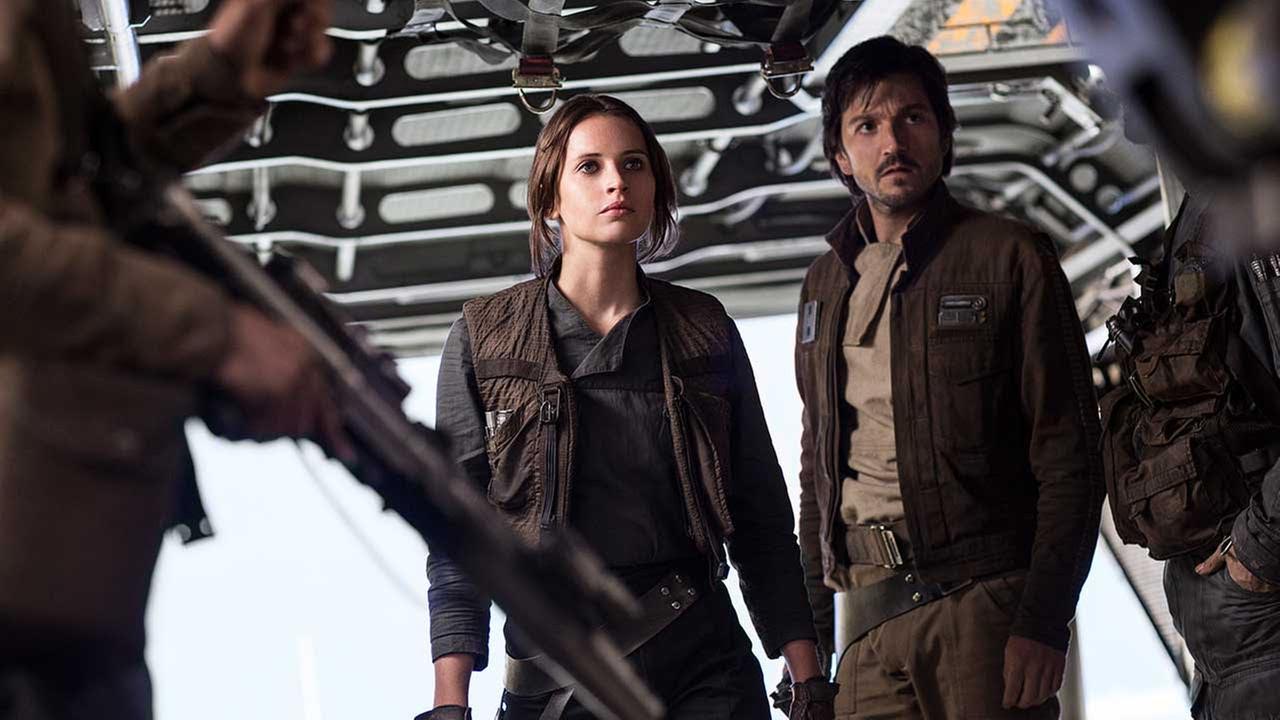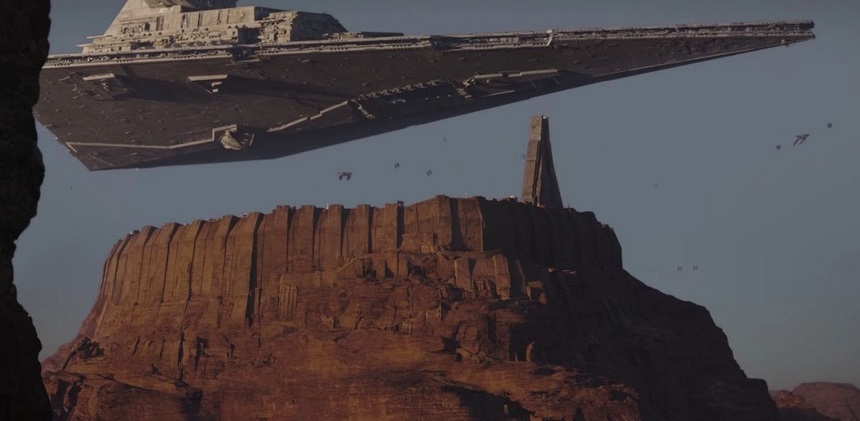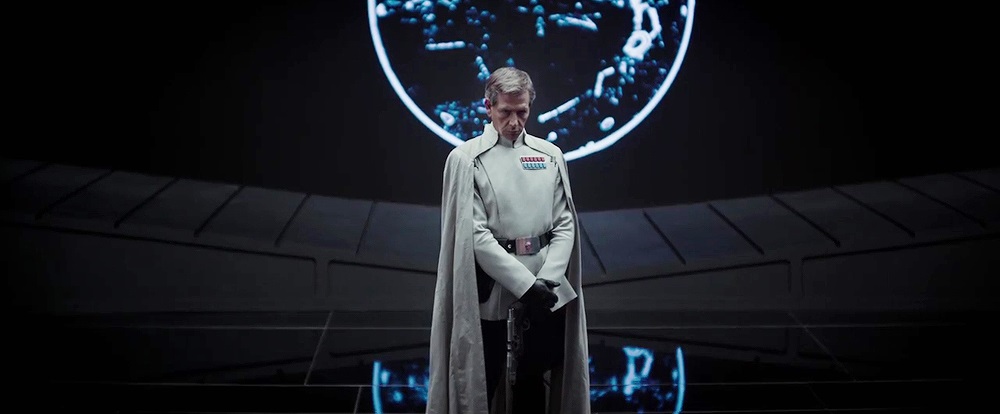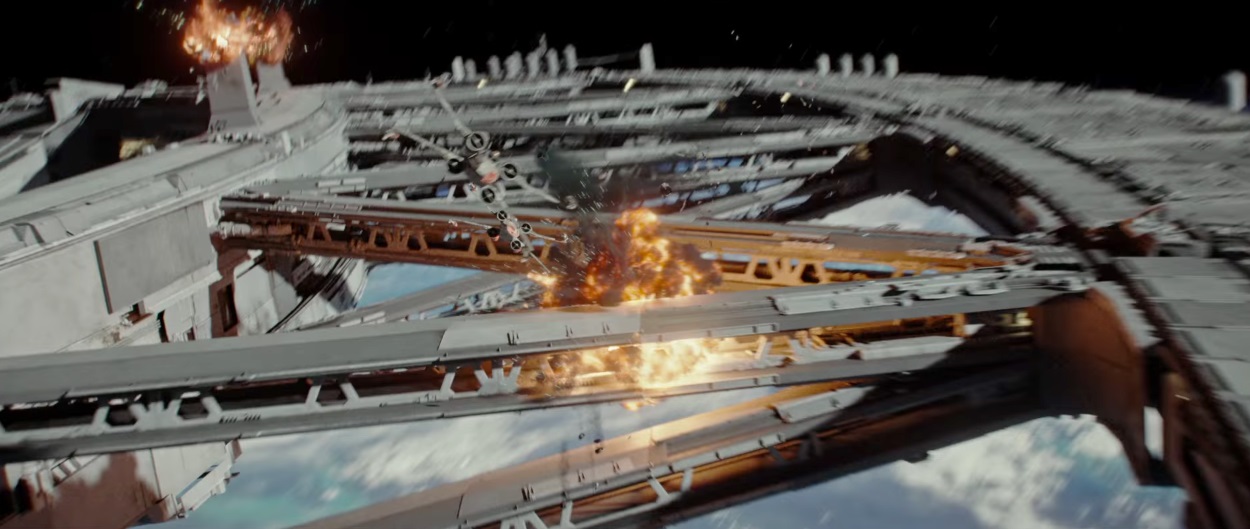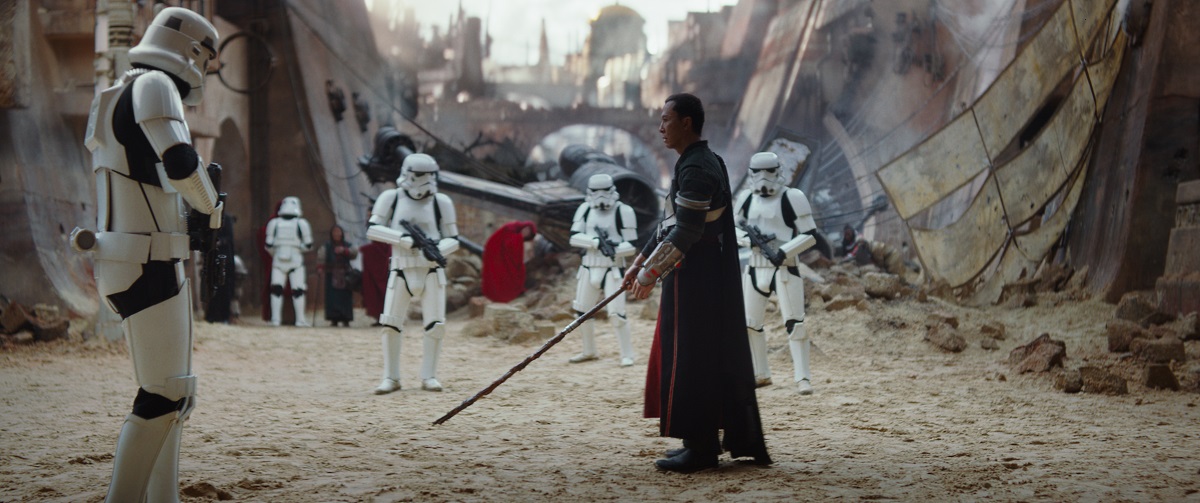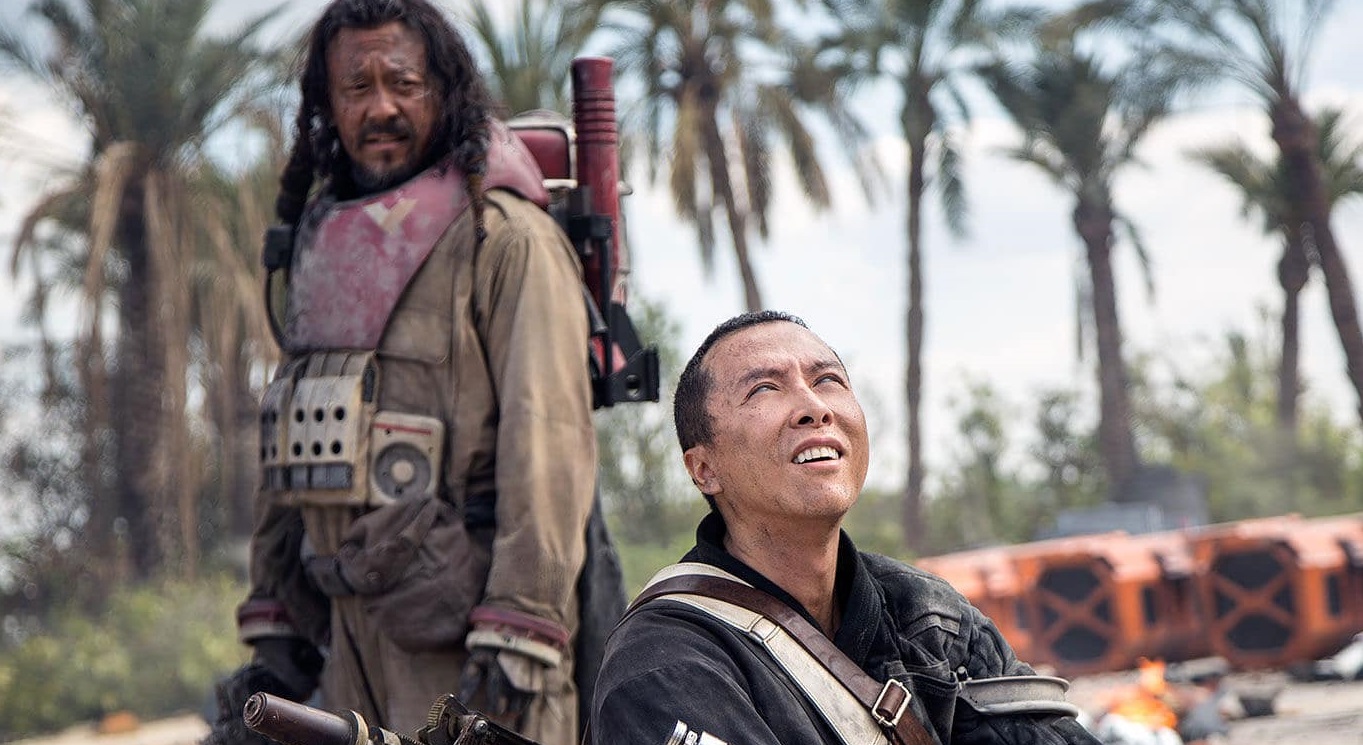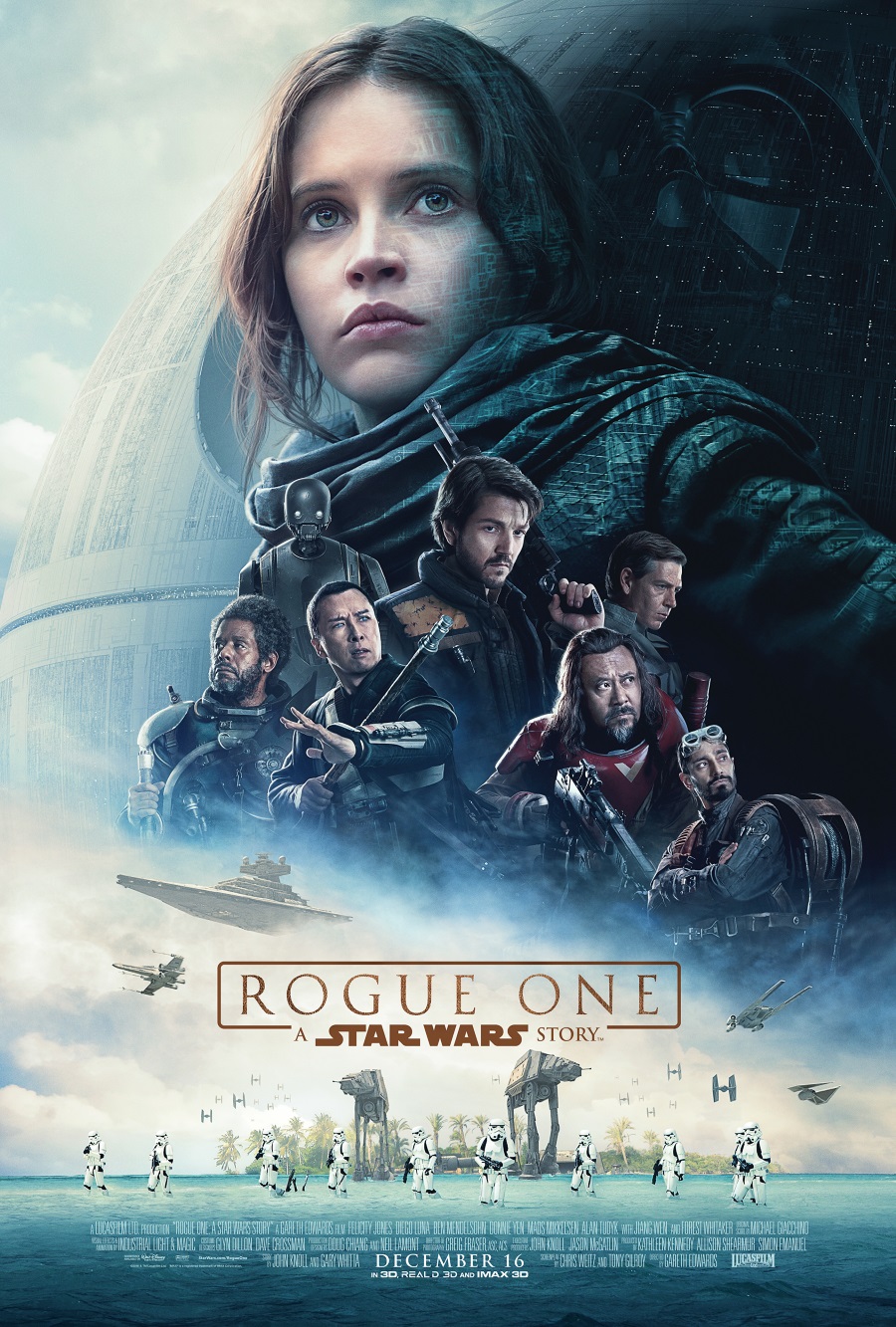Screen Anarchists On ROGUE ONE: A STAR WARS STORY

(Do anarchists like rogues and rebels, or is there a disturbance in The Force?)
Earlier this week I managed to get into a 3D IMAX screening of Rogue One: A Star Wars Story, and I was surprised to notice how divided the opinions in the audience were afterwards, especially since I already had read so many glowing reviews. It made me wonder: how are our opinions here at Screen Anarchy Central?
So, like with the previous Star Wars film, we had a quick round-up of opinions about the film and decided to put them here for all to see, in a gallery. I'm warning for spoilers, but to be honest: if you've ever seen the very first Star Wars from 1977, you kind-of already know where this is going, right?
We start with Jim Tudor, who wrote our official positive review of the film, and who states that "This battle station is fully operational!"
Jim Tudor, , Kurt Halfyard, Christopher Webster, Michele "Izzy" Galgana, Ernesto Zelaya Miñano, Andrew Mack, Ben Umstead and James Marsh
contributed to this story.











Rogue Leader: Jim Tudor, Featured Critic
Rogue One is a candid in its portrayal of a flawed and difficult Rebel Alliance. Although it is led by familiar faces Mon Mothma (Genevieve O'Reilly) and Bail Organa (Jimmy Smits), and stationed in the established Yavin 4 secret base (recreated to a tee), this Rebel Alliance is not always easy to root for. This courageous depiction is much to the film's credit. Good and evil remain, but basic interactions with them are humanly cloudy as ever. This aspect of Rogue One is just one such factor that places it alongside of 2005's Revenge of the Sith in terms of dark, less kid friendly visions of Star Wars.
Just as long-lingering, nitpicked details of George Lucas' original 1977 film are finally addressed and laid to rest, Rogue One also releases a whole host of new debate fodder into the universe, just to restore balance. Because, if everything were all perfectly explained and crystal clear, it just wouldn't be the Star Wars we love so much.
But Rogue One's got it where it counts: The battle scenes, when they finally do roll around, are spectacular. Several cameos by past characters are impressive, most impressive. And the tactile quality of the film never feels like anything less than returning home again. Don't expect it to mesh perfectly with the stylistic template of all previous entires, but that's the point: This is the stand-alone debut; the rogue one. And a welcome first of many.
(Excerpt from Jim's full review)
Rogue Two: Jason Gorber, Featured Critic
Ever since Disney took on Lucasfilm and hinted at new directors its these stand-alone projects I’ve personally been most excited for. There’s a spirit of possibility here exhibited in the animated works like Clone Wars and Rebels, yet those too have the task of working within episodic structure. Serving as a single star within a constellation, it’s this singularity that gives the film much of its strength. The film absolutely lives off what has come before, and I’m frankly unable to say just how it’d play seen divorced from this context. But as pure retcon-meets-thought experiment, Rogue One scratches an itch that has been tickling since that initial screening in ’77.
It may not be too deep, but there’s still depth here. It may not be building a whole universe, but it’s a well-drawn world being sketched. It may not have characters meant to thrive over the span of many entries, but that doesn’t lessen when things turn for the worse. Rogue One is by both its origin and its nature not the beginning of something nor the end, but at the same time it is setting in motion what’s to come after the next two episodes culminate the Skywalker Saga. This is the template for the standalone films – ambitious, respectful of the past while forging its own tone and vision. It opens up the possibility for darker stories yet to come, but equally lighthearted and silly ones, childish or adult ones. The scaffolding of Lucas’ universe is such that creative people will make of it what they will, and this work not only builds on what’s already been done on that front but very much sets in motion what’s likely decades of similarly tangential works connected to the core saga story.
Thus Rogue One answers a question fans rarely would have asked – After the crawl stops flying past camera and the Skywalker tale is told is there still room for energizing, cinematic stories set in that galaxy far, far away?
The answer, it seems, is a resounding yes.
(These are excerpts from Jason's larger and even more eloquent look at the film over at Dork-shelf.)
Rogue Three: Kurt Halfyard, Contributing Writer
Two lines of dialogue in essence sum up my Rogue One (A Star Wars Story) experience.
The first line is the films’ thematic keystone: "Trust goes both ways."
The ship-full of disparate, and morally grey, ne’erdowells start out as vagrants - at best criminals, at worst terror cells, who end up defying The Rebel Alliance leadership to go, ahem, rogue. The aim is clearly to get what is needed to be done, in spite of the Yavin 4 bureaucracy.
Mon Mothma, Bail Organa, and Princess Leia all mean well, but they are the executive committee, while Jyn and Team-Rogue are the rank-and-file that understand the devil is in the details. The characters (and creators) may be the second tier, but that does not mean they are not onto a successful approach -- one which underscores why this years other B-Team, Suicide Squad, fell flat. It is a growing trust between those on-the-ground, and in particular between Jyn and her reluctant ‘handler’ Cassian (a spy who is quite capable of casual murder if it suits his purpose), that make this movie more than just a sum of jingling and jangling set pieces, or the specter of pandering fan service.
The key second line is casually tossed out (in the same scene as the first) by reprogrammed Imperial strategy droid, Kaytoo: "I find that answer vague and unconvincing."
As with the J.J. Abram's soft-reboot of the franchise, these new Star Wars stories, whether they follow the ongoing adventures of the Skywalker clan, or not, are made in the 21st century fashion: i.e. don't stop for anything as the audience might get bored. The many death scenes in Rogue One (take for instance a certain iconic Danish thespian) are a wee bit unconvincing and emotionally flat due to the speed with which set up and execution occur.
Some advice to blockbuster film-makers: Slow down and remember your 1970s movie-brat training: allow locations and ideas to breathe before running headlong into the thick of it. More glue and less paint helps story and emotion resonate in a way that might elevate your franchise chapter to 'movie classic.' (And while we are offering advice, keep the CGI zombie-actors off screen. Digitally resurrecting dead people is a questionable idea, done here with questionable execution.)
Along similar lines, two planets get offed in this chapter, which diminishes the significance of such a monumental destructive act. Planet killing, perhaps, should not be too casual or commonplace (see also Abrams' Star Trek reboot). Now that a new Star Wars movie plops off the assembly line on an annual basis, the consequences of such predictable regularity are that of diminishing impact. Making every entry 'exceptional' is a contradiction in terms. I personally feel that these interstitial stories should be small and gritty and experimental, not ‘just another Star Wars movie.’ Rogue One is, too often, just another Star Wars movie.
Rogue Four: Christopher Webster, Contributing Writer
Some jarring narrative shortcuts notwithstanding, Rogue One expands on the mythology of George Lucas' original 1977 film in a way that is both respectful and additive. And while it remains to be seen whether adding shades of grey to an archetypal story about good vs. evil will help or hinder the saga's universality in the long run, I don't think I breathed for the last 30 minutes, which says something about how the film works as an experience.
Ultimately a welcome slice of space opera. I can't help but look forward to more adventures in a galaxy far, far away.
Rogue Five: Michele "Izzy" Galgana, Associate Editor
Rogue One is bleak as fuck. As a horror connoisseur, I’ve been asked if I think it’s a horror movie, and I can agree with that assessment indirectly. Rogue One is a war movie, and in war, there is pure horror. Of course, Gareth Edwards is a sci-fi/horror guy, with both Monsters and Godzilla under his belt.
Felicity Jones is decent as heroine Jyn Erso, but her character arc seems forced from “I don’t believe in rebellion” to “they killed my dad and I’m going to lead a rogue attack on the Empire.” In his small role as Jyn’s father Galen — the chief architect of the Death Star — Mads Mikkelsen kills it. Jimmy Smits and Forest Whitaker are both underused, but I’m glad to have them there at all. Rounding out the international cast are Diego Luna, Donnie Yen, Wen Jiang, and Ben Mendelsohn, who’s fantastic as the villain Orson Krennic.
Of course, there are nods to several characters in the original 1977 Star Wars film, both big and small — because why not have a little fun before everything goes apocalyptic? CGI Peter Cushing is definitely in the uncanny valley territory, and I did enjoy seeing him on the big screen again, even at the cost of being taken out of the story by the weirdness. I do wish they’d hired a better voice over artist for Grand Moff Tarkin, however.
There are a lot of people who dislike Rogue One because it’s “not as fun” as the other films. I think that this is exactly the film’s strength. There is real gravitas here — almost everyone dies, as if Martin Scorsese was hired to direct. It’s sad, but it’s great because that means that you actually care about the characters and the story.
Dutch Leader: Ard Vijn, Associate Editor, Features
Last year, with The Force Awakens, we saw a happy return to character-driven Star Wars films. A good thing that was too, as the film these characters were in was pretty awful in my opinion; the first episode in the series which contained not a single scene to entice me into buying it on Blu-ray.
With Rogue One I spot the opposite: I can't wait to plunk in a disc and re-re-re-rewatch some bits! Director Gareth Edwards has a special effects background, and has probably been playing out several of these shots in his mind for decades already. Pennies would drop in my mind over and over again: THIS is how you reveal a Star Destroyer, THIS is how you do capital ships battling, THIS is how Darth Vader should look in a dark hallway... there is quite a big list of awesome moments, and I really want a second viewing to savor all of these on a big 3D screen again.
But moments alone do not a good movie make, and sadly I didn't enjoy the remainder as much as I wanted. Rogue One is also the opposite of The Force Awakens in that all of the characters seem to know they are supporting ones in someone else's story. Granted, some of these are excellent, especially Donnie Yen as "Space Zatoichi" is great (though you could probably throw in a racial stereotype criticism if you are so inclined), but you never escape the impression you're stuck in a small dead-ended side story.
Speaking of story: it is an old joke that the franchise's first film can be summed up as "Orphaned Farmer Boy radicalizes after a military strike kills his remaining family, so he joins a group of insurgents and commits a terrorist act which kills over 300,000 people". Well, Rogue One takes that joke a whole lot further, with everyone willing to sacrifice their lives, their ships, their children's lives even, all for... a thin slice of hope, carried by a rebellion whose upper echelons come across as a bickering lot of crazy fanatics and untrustworthy cowards. No wonder the script needs to throw in a genocide or two to keep the Empire looking evil!
Once again, we're left with a film which cannot hold a candle to the original trilogy, but... at least it has some moments which surpass anything which came before.
Rogue Six: Ernesto Zelaya Miñano, Contributing Writer
Rogue One starts out as a convoluted mess, hopping from planet to planet so fast it’s liable to give you whiplash while introducing one character after another. If you’re not caught up on your Star Wars lore, you’ll probably get lost in record time. As I sat in the theater, trying to make sense of what was (ultimately) a very simple story, I wondered if buying a ticket for myself as a birthday present had really been a good idea.
Once it’s past the first 30-40 minutes, however, the movie takes off running and never looks back, giving us something entirely new in the SW universe: a gritty war story about a group of rebels on a suicide mission. The final stand on Scarif makes for a great action movie, and it segues so masterfully into A New Hope you’ll want to watch it immediately after just to see how Gareth Edwards pulled it off.
There’s a great group of characters here – Felicity Jones’ determined Jyn Erso, the sarcastic robot (Alan Tudyk should just voice everything from now on), Donnie Yen’s blind monk beating the shit out of the useless-as- always Stormtroopers – but the true star here is Darth Vader. In just two scenes, the Dark Lord reinstates his position as one of cinema’s most iconic villains; a badass you don’t mess with.
This is a movie made for the fans, who’ll go wild for all the references and callbacks. For the casual ones, it’s still a solid action flick that delivers once it overcomes its shaky first half. And with no Force powers, lightsabers, Jedis or any member of the Skywalker family in sight for once, it’s proof that this universe still has a lot of stories left to tell.
Rogue Seven: Andrew Mack, Associate Editor, News
Rogue One is all about the Raid on Scarif and the quick prologue to that battle isn’t it? Everything else in Rogue One builds to that wondrous point, one of the happiest moments I have had this year.
You see, as a young boy I idolized my grandfather because he fought in WWII and little boys need heroes. So war films were my bread and butter when I was in grade school. The idea of a Star Wars film modeled after a film like The Dirty Dozen? I was into that from the start.
Rogue One never got so personal with the characters so we had someone to truly mourn when they passed. Maybe the production felt they did not have to. With exception to Chirrut Îmwe and Baze Malbus I do not believe that anyone else’s death impacted the audience like, say, Donald Sutherland’s did in DD. Okay. Tudyk’s K-2SO too. Rogue One is more about the spectacle of the raid. The Fleet showing up. The inclusion of Red and Gold Squadron leaders. The death of Red Five.
Then Vader. Fucking Vader. Like a boss.
Also, there was that moment when Cassian Andor talks of grey area that agents for the Rebellion operated in, suggesting that getting the Death Star plans would somehow redeem him and those who did those things in the name of the Rebellion. But not extremists. Rebels. Just to be clear. With all of them out of the way now the Rebellion can continue along its moral high ground.
Rogue Eight: Ben Umstead, U.S. Editor
As far as I am concerned Rogue One is the first ‘Star Wars’ that puts a truly meaningful, and thus bleak, emphasis on the ‘war’ in the series’ title. Or at least it makes an earnest attempt to.
Firstly, what is to be commended here, beyond a doubt, is the incredible craftsmanship and artistry on display. Greig Frasier’s cinematography is the moodiest, most mature and immersive lensing yet of this galaxy far, far away. While Doug Chiang and Neil Lamont’s production design, hand in hand with the art directors, costumer designers and concept artists, enriches the ‘how we see‘ with a sumptuous ‘what we see‘. Director Gareth Edwards offers a sense of scale and perspective that marries all this beautifully, making Rogue One the most tactile, textured Star Wars tale on the big screen. As a child who grew up on the noncanonical expanded universe in the 1990s this had me grinning ear to ear.
I want to say that Felicity Jones owned this movie. Yet the truth lies slightly elsewhere. She owned the role of Jyn Erso, with a nuance and depth that is rare in the Star Wars universe of acting. Sadly, much of that gets lost in the oncoming cacophony of plot points that collapse under their very own momentum. Indeed, there are a string of great performances buried in this movie, all reaching for the possibility of great characters that are, alas, a few drafts away.
However, my greatest desire for Rogue One may actually not lie in the quality of the writing found in the script, but rather the writing done in the edit bay. It would have served everything on screen a whole lot better had we just slowed down a step or two, so as not to trip up. In other words, there is a great rushing density here, but a fleeting sense of narrative depth and emotional resonance.
So, like its own story, and with any allegory found in it for our world, will Star Wars movies be perpetually in conflict with themselves? Collapsing in on expectation and a mythology that exists more in the pop culture ether rather than in the actual experience of watching a good story. This is where I turn my attention towards the inherent danger of iconography. For this is a movie that totally and completely truncates a moment of closure for the people we’ve just spent the last two hours with in favor of blatant fan service; a “that was fucking cool” beat of action. If ethics for storytelling exist then a choice like this is revolting at worst, and disheartening at best.
All this leads me to put up my hands in protest and exclaim “next time lets make a movie rather than make a release date.”
Rogue Nine: James Marsh, Asian Editor
Unlike The Force Awakens, which leaned heavily on audience nostalgia for familiar characters and a recognisable rite-of-passage narrative, Rogue One confidently plunders WWII favourites The Dirty Dozen and Where Eagles Dare (with a bit of Seven Samurai for good measure) for a thrilling tale of ethnically diverse loners, defectors and innocents on a dangerous mission behind enemy lines.
Many man-child tears have been shed over the CG resurrection of Peter Cushing, but it was wholly justified by the story and the effect is eerily realistic. No doubt the debate will continue to rage over the ethics of bringing dead thesps back from the grave, but there’s neither the time nor space to go into that now.
Instead, let’s highlight how Rogue One is perhaps the best example yet of a Hollywood blockbuster actively catering for the Chinese market. Recent examples of stunt casting (Jay Chou & Macau locations in Now You See Me 2, Angelababy in Independence Day: Resurgence, entirely new scenes featuring Fan Bingbing in Iron Man 3) have met with derision from all quarters. Here, however, the inclusion of Donnie Yen and Jiang Wen proves infinitely more successful. Yen finally achieves the crossover recognition he’s been chasing for decades, while Jiang does more with even less, and their touching bromance proves one of the film’s many highlights.

More about Screen Anarchists On
More about Have Your Say
Around the Internet
Recent Posts
Leading Voices in Global Cinema
- Peter Martin, Dallas, Texas
- Managing Editor
- Andrew Mack, Toronto, Canada
- Editor, News
- Ard Vijn, Rotterdam, The Netherlands
- Editor, Europe
- Benjamin Umstead, Los Angeles, California
- Editor, U.S.
- J Hurtado, Dallas, Texas
- Editor, U.S.
- James Marsh, Hong Kong, China
- Editor, Asia
- Michele "Izzy" Galgana, New England
- Editor, U.S.
- Ryland Aldrich, Los Angeles, California
- Editor, Festivals
- Shelagh Rowan-Legg
- Editor, Canada


